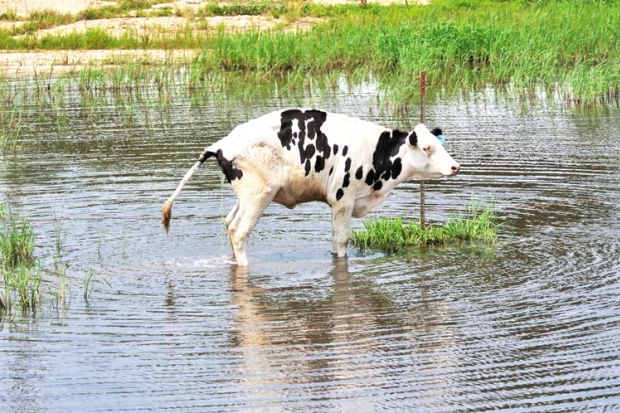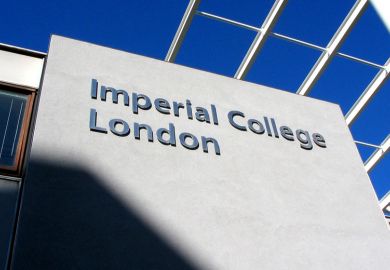Have you ever looked at your boiled egg and, in a moment worthy of Proust, thought: “How I wish I could unboil this.”
Possibly not.
But, following the announcement of the 2015 Ig Nobel Prizes, and thanks to academics’ unwavering commitment to the research cause, this dream has become a reality.
Callum Ormonde and his colleagues at the University of Western Australia took the gong for chemistry for creating a chemical recipe that partially unboils an egg.
The research, published under the eye-catching title “Shear-stress-mediated refolding of proteins from aggregates and inclusion bodies”, joined winners from the fields of physics, literature, economics, medicine, mathematics, biology, diagnostic medicine, and physiology and entomology at the 25th Ig Nobel awards ceremony, held at Harvard University's Sanders Theater last night.
The University of Chile’s Bruno Grossi, who (along with colleagues) won the prize for biology, continued the poultry theme. His team observed that when you attach a weighted stick to the rear end of a chicken, the chicken then walks in a manner similar to that in which dinosaurs are thought to have walked.
It was nice to see both the chicken and the egg coming first in their respective categories.
Although I had heard of the Ig Nobels before (they were devised by Annals of Improbable Research magazine), I had erroneously equated them with the Razzies, the annual Tinseltown “celebration” of the worst of cinema. While Razzie winners are now afforded cult status for mediocrity, the Ig Nobels honour “achievements that make people laugh, and then think”.
They celebrate the “unusual, honor the imaginative — and spur people's interest in science, medicine, and technology”. Previous winners are also bona fide Nobel laureates.
@smitajamdar @BBCNews Geim won one (for levitating frogs) before his actual Nobel prize: http://t.co/KqFpmKF8aH
— Phil Baty (@Phil_Baty) September 18, 2015
The awards do occasionally, however, honour more dubious research. Into this category I would place recent work by the Bangkok Metropolitan Police, who took home the 2015 economics prize for “offering to pay policemen extra cash if the policemen refuse to take bribes”.
Other winners, though, are well within the realms of reasonable academic investigation (although the REF adjudicators might have a few things to say about their “impact”). Take the joint winners of the physiology and entomology prize.
Justin Schmidt, a US entomologist who works at the Southwestern Biological Institute in Arizona, was rewarded for “painstakingly creating the Schmidt Sting Pain Index, which rates the relative pain people feel when stung by various insects”.
He shared the award with Michael L. Smith of Cornell University, who earned plaudits for “carefully arranging for honey bees to sting him repeatedly on 25 different locations on his body, to learn which locations are the least painful (the skull, middle toe tip, and upper arm) and which are the most painful (the nostril, upper lip, and penis shaft)”.
It might be just a stab in the dark, but I’d say that allowing yourself to be stung on your nether regions in the name of science is worthy of any academic accolade.
Like poultry, genitals were a prevailing theme this year. Researchers from the Georgia Institute of Technology, led by mechanical engineering PhD candidate Patricia Yang, took the physics crown for testing the principle that “nearly all mammals empty their bladders in about 21 seconds (plus or minus 13 seconds)”.
Given the variables, however, I’m inclined to think that in this case, some not So Solid research has finally proved that it takes 21 Seconds to go.
Ig Nobel Prize winners 2015
Chemistry
Callum Ormonde and colleagues invented a chemical recipe to partially unboil an egg.
Physics
Patricia Yang and colleagues tested the biological principle that nearly all mammals empty their bladders in about 21 seconds.
Literature
Mark Dingemanse and colleagues for discovering that the word “huh?” (or its equivalent) seems to exist in every human language — and for not being quite sure why.
Management
Gennaro Bernile and colleagues for discovering that experiencing natural disasters without extremely negative consequences “appears to desensitize CEOs to the negative consequences of risk”.
Economics
The Bangkok Metropolitan Police for offering to pay policemen extra cash if the policemen refuse to take bribes.
Medicine
Awarded jointly to two groups for experiments to study the biomedical benefits or biomedical consequences of intense kissing (and other intimate, interpersonal activities).
Mathematics
Elisabeth Oberzaucher and Karl Grammer for trying to use mathematical techniques to determine whether and how Moulay Ismael the Bloodthirsty, the Sharifian Emperor of Morocco, managed, during the years from 1697 through 1727, to father 888 children.
Biology
Bruno Grossi and colleagues for observing that when you attach a weighted stick to the rear end of a chicken, the chicken then walks in a manner similar to that in which dinosaurs are thought to have walked.
Diagnostic medicine
Diallah Karim and colleagues for determining that acute appendicitis can be accurately diagnosed by the amount of pain evident when the patient is driven over speed bumps.
Physiology and entomology
Awarded jointly to Justin Schmidt, for painstakingly creating the Schmidt Sting Pain Index, which rates the relative pain people feel when stung by various insects; and Michael L. Smith, for carefully arranging for honey bees to sting him repeatedly on 25 different locations on his body, to learn which locations are the least painful (the skull, middle toe tip, and upper arm). and which are the most painful (the nostril, upper lip, and penis shaft).




